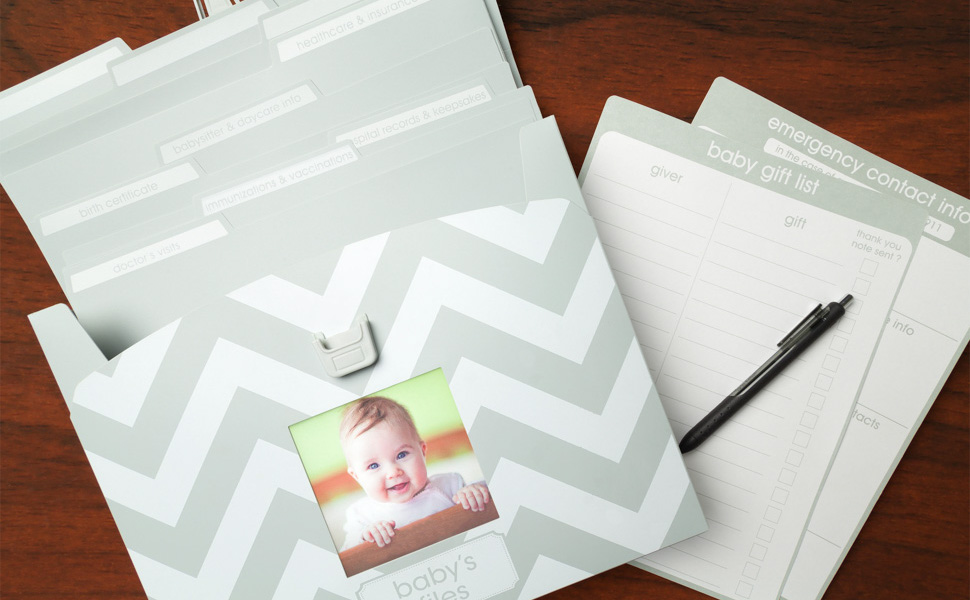
Bringing a baby into the world comes with a flood of emotions—and a mountain of paperwork. Between doctor’s visits, insurance, parental leave, and all the “what-ifs,” it can feel like you need a personal assistant just to stay on top of everything.
But don’t worry—we’ve got you. Organizing your documents and healthcare plans now will not only save you stress later, it will also help you feel more in control and confident as you head into parenthood.
This guide walks you through what to gather, where to keep it, and how to make your future self say, “Thank you, Past Me.”
Why Organizing Now Matters
Before baby arrives, your focus might be on onesies and bassinets—but once labor starts, your brain will be 95% baby and 5% “Where’s my ID?!”
Getting your essential paperwork and healthcare plans in place:
- Helps during emergencies
- Streamlines hospital check-in
- Eases transitions for work and insurance
- Ensures both parents (and caretakers) are informed
Think of it as creating a baby-ready binder or digital folder for peace of mind.
What to Organize: Your Pre-Baby Checklist
Healthcare Documents
- Health insurance cards (both parents)
- OB-GYN/midwife information & contact
- Pediatrician info (pick one before birth if possible)
- Hospital pre-registration confirmation
- Birth plan (if you have one)
- Medical records (including test results, allergies, or special conditions)
- Emergency contacts
Keep a printed copy in your hospital bag AND a digital version on your phone or cloud storage (like Google Drive or Dropbox).
Legal & Identification Documents
- Valid photo IDs for both parents (needed for hospital forms)
- Social Security application paperwork (usually done at hospital, but check)
- Marriage or partnership certificate (if needed for legal forms)
- Custody or guardianship papers (if applicable)
Note: Your baby’s birth certificate paperwork will be filled out at the hospital, so make sure names and spellings are agreed on ahead of time.
Insurance & Benefits Info
- Health insurance policy info and claim instructions
- Disability insurance (if using short-term disability)
- Paid family leave (check with your HR department or state agency)
- Employer parental leave paperwork (get this started before labor begins)
- FSA/HSA account details (for reimbursing expenses like breast pumps)
Review your policy to see what’s covered—prenatal classes, doulas, lactation consultants, and even car seats may be eligible for reimbursement!
Emergency Plan & Contacts
- Emergency contacts list (include family, neighbors, and your pediatrician)
- Written backup plan for labor support and childcare (in case partner is unavailable)
- Copies of driver’s licenses, health cards, and birth plan in a shared location
- Pet care plan (if you have fur babies!)
After Baby: What You’ll Need to File or Update
- Apply for baby’s Social Security number
- Add baby to your health insurance (must be done within 30 days!)
- Update your will and designate a legal guardian
- Consider setting up a savings account or 529 education plan
Use a simple checklist or calendar reminder for each of these tasks in the first few weeks postpartum.
Where and How to Store It All
Physical Folder or Binder
Create a labeled folder with dividers:
- Healthcare
- Insurance
- Birth/hospital
- Legal/ID
- Work/Leave
Keep it in a safe, easy-to-access location like your hospital bag or bedside table.
Digital Backup (Highly Recommended)
Scan or photograph all documents and store in:
- Google Drive
- Dropbox
- A secure password-protected folder on your computer
- Use a password manager for logins and insurance portals
Share access with your partner or support person!
Bonus: Emergency Card Template
Make a quick wallet card or phone note that includes:
- Your full name & DOB
- Your partner’s contact info
- Your provider’s name & number
- Your blood type (if known)
- Allergies
- Hospital preference
You can also store this in your phone’s Health/Medical ID or lock screen.
Final Thoughts: Your Future Self Will Thank You
Parenthood is unpredictable—but organizing your documents doesn’t have to be. Taking a few hours now to prep your paperwork and plans is one of the kindest things you can do for yourself, your partner, and your baby.
You’ve already got everything you need to be a thoughtful, prepared parent. Now you’ve got a system to match.
Westchester County Resources
1. Westchester County Department of Health – Prenatal Care Services
- Services: Provides information and referrals for prenatal care, including assistance for uninsured women.
- Phone: (800) 522-5006 (Growing Up Healthy Hotline)
- Website: health.westchestergov.com/prenatal-care-services-Putnam County Government+4Westchester County Health+4nwh.northwell.edu+4
2. Westchester County Health Insurance Navigators
- Services: Assists with enrollment in health insurance plans such as Medicaid and Child Health Plus.
- Phone: (914) 995-6350
- Email: [email protected]
- Website: health.westchestergov.com/health-plan-web-sitesWestchester County Health
3. Westchester Community Health Center – Insurance Enrollment Help
- Services: Provides assistance with health insurance enrollment and guidance on necessary documentation.
- Website: westchestercommunityhealthcenter.org/for-patients/insurance-enrollment-help/Live Nation+8Westchester County Health+8Westchester Community Health Center+8Westchester Community Health Center
4. NewYork-Presbyterian Westchester – Baby-Talk Hotline
- Services: Offers support and answers to questions about parenthood and infant care.
- Phone: (914) 787-4974
- Website: nyp.org/westchester/womens-health/maternity-care/during-and-after-childbirthRoosevelt Island Operating Corporation+2NewYork-Presbyterian+2nwh.northwell.edu+2
Putnam County Resources
1. Putnam County Department of Health – New Parent Support
- Services: Provides resources and support for new parents, including breastfeeding support groups.
- Phone: (845) 808-1390
- Address: 1 Geneva Rd, Brewster, NY 10509
- Website: putnamcountyny.gov/health/newborns/Patient Care at NYU Langone Health+2Westchester Medical Center+2Westchester County Health+2Live Nation+2Putnam County Government+2Putnam County Government+2Putnam County Government+1Putnam County Government+1
2. Healthy Families Putnam – Maternal Infant Services Network
- Services: Offers home-based services to support expectant families and new parents, including assistance with organizing healthcare plans and documents.
- Phone: (845) 561-3575
- Address: 155 Main Street, Brewster, NY 10509
- Website: misn-ny.org/healthy-families-putnam
Bibliography
Centers for Disease Control and Prevention. (2022). Emergency preparedness for children in disasters. https://www.cdc.gov/childrenindisasters/
Healthcare.gov. (n.d.). How to add a child to your health insurance plan. https://www.healthcare.gov/
National Partnership for Women & Families. (2021). Expecting better: A state-by-state analysis of laws that help expecting and new parents. https://www.nationalpartnership.org/
Social Security Administration. (2023). Apply for a Social Security number for your baby. https://www.ssa.gov/ssnumber/
What to Expect. (n.d.). Hospital bag checklist: What to pack for labor and delivery. https://www.whattoexpect.com/
Legal Disclaimer: The information provided by our nonprofit is for informational purposes only and not a substitute for professional medical advice, diagnosis, or treatment. Always consult a qualified healthcare provider for medical concerns. We make no guarantees about the accuracy or completeness of the information and are not liable for any decisions made based on it. If you have a medical emergency, call 911 or seek immediate medical care.


